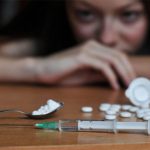 The use of legal drugs in a manner or amount contrary to their intended dosage or purpose and the use of illegal drugs for the purpose of bringing about a change in feelings, mood, or behavior.
The use of legal drugs in a manner or amount contrary to their intended dosage or purpose and the use of illegal drugs for the purpose of bringing about a change in feelings, mood, or behavior.
Drugs, almost always mood altering drugs, that are taken to help cope with stress, to relieve pain, to enhance pleasure, and are thus taken too often and on too large a dosage.
Persistent or sporadic drug use inconsistent with or unrelated to acceptable medical or cultural practice. The definition of drug abuse is highly variable, sometimes also requiring excessive use of a drug, unnecessary use (thus incorporating recreational use), drug dependence, or that the use be illegal.
When a drug interferes with your daily life or activities.
Physical and psychological dependence on chemical substances, including over-the-counter drugs, prescribed medications, or illicit substances, used primarily for the physical and emotional effects they produce rather than for therapeutic reasons. While some drug abuse results when a person becomes dependent on a drug initially used for therapeutic reasons, such as tranquilizers, among young people drug abuse more often results from experimentation with so-called recreational drugs, especially during the vulnerable and uncertain period of adolescence. With regular or heavy use, various physical changes occur as the body becomes dependent on the drug so that, if use ends, severe physical and mental distress called withdrawal symptoms result. Once drug abuse is established, a person often needs to enter a special treatment program to undergo withdrawal. Drug abuse is certainly one of the major social problems in the world today and one of the major challenges facing parents of young children, not only for itself but also for the possibly life-threatening infections that are often linked with drug use, notably aids and hepatitis. Many parents are working actively on prevention programs aimed at young children, hoping to head off drug use before it begins.
Use of a drug for nontherapeutic purposes (e.g., to alter one’s sense of awareness, as with lysergic acid diethylamide—LSD). Commonly abused substances include barbiturates, alcohol, sedatives, and amphetamines. Drug abuse can lead to physical and mental damage, and with some substances, to drug dependence and addiction. Drug abuse and drug addiction are serious proWems in our society today. Particularly worrisome is the growing incidence in elementaiy and secondary school-aged children.
The use of illegal drugs or the use of a legal drug in excessive quantities or for purposes other than those for which it is normally intended.
Any agent that impairs behavior, health, social interactions, or thought and is difficult not to use compulsively. Many of these agents, including ecstasy, lysergic acid (LSD), methamphetamines, the opiates, and phencyclidine, are considered controlled substances in the U.S. Alcohol and tobacco products are not traditionally considered to be drugs of abuse, although they are addictive and harm many people.
The intentional improper or unsafe use of a drug.
The intentional misuse of any kind of drug for nonmedical purposes.
Utilizing a medication in a way that deviates from its intended or prescribed use is a common practice. Drugs frequently misused include stimulants like cocaine and amphetamines; central nervous system depressants like alcohol and barbiturates; hallucinogens like LSD; and narcotics like heroin. Certain drugs are also abused in an attempt to enhance athletic performance.
Issues stemming from drug misuse can occur due to the drug’s harmful side effects, accidents that transpire while under the influence, or the addictive nature of many drugs, potentially leading to a reliance on them.
